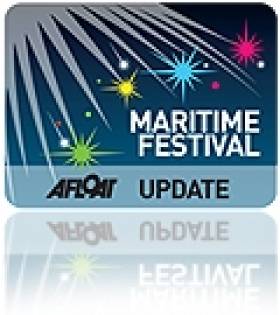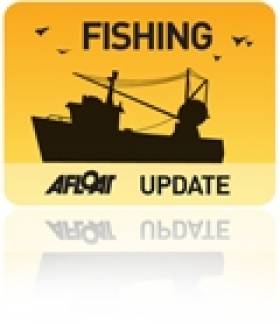Displaying items by tag: Darina Allen
#maritimefestival – Food critic Sally McKenna, TV chef Darina Allen and food writer Dr. Prannie Rhatigan are among the participants in the 2014 Burren Slow Food Festival, which takes place tomorrow and Sunday.
Supported by the Burren & Cliffs of Moher Geopark and also featuring members of the Burren Food Trail and the Burren Adventure, the 8th annual festival is being held at various venues throughout Lisdoonvarna, Co. Clare.
As Afloat.ie reported recently, Seaweed is a common theme across the Festival Programme this year.
Author of "Irish Seaweed Kitchen", Prannie Rhatigan GP is hosting a demonstration and talk on how the thousands of tonnes of seaweed washed up on Irish coastline each day can be exploited for their potential as a foodstuff.
Meanwhile, Sally McKenna of John and Sally McKennas' Guides (formerly The Bridgestone Guide) and Stefan Kraan, author of "The Science and Gastronomy of Umami", will be discussing the benefits for Ireland's seafood industry in harvesting seaweed.
The festival also features food sampling of local artisan foods, a chance to meet local producers and growers, engage with fellow foodies, and enjoy cookery demonstrations from well-known chefs including Jess Murphy, Kai Restaurant, Galway; John Sheedy, Sheedy's, Lisdoonvarna; and Aidan McGrath, Wild Honey Inn, Lisdoonvarna.
Other highlights of the weekend include a talk by Slow Food Ireland President and chef Darina Allen; a Wild Food Foraging Walk hosted by Oonagh O'Dwyer from Wild Kitchen in Lahinch; and a demonstration of the essential skills of making handcrafted fine chocolates by Burren Chocolatier and Burren Food Trail Kasha Connolly.
The main festival banquet on Saturday night will be prepared by Vivian Kelly of Kierans Kitchen at the Roadside Tavern who will serve Gleninagh Lamb, Burren Smoked Irish Organic Salmon, desserts from Fabiola's Pâtisserie and wines from Burren Fine Wine & Food.
#Fishing - The Irish Times reports that Inland Fisheries Ireland (IFI) has expressed "serious concerns" over the findings of a new study on wild salmon in Ireland.
The State agency for Ireland's fisheries argues that the study - which concluded not only that pollution has a greater impact on wild salmon numbers than fish farming, but also that salmon catchments in close proximity to aquaculture schemes were some of the best performing - is based on flawed methodology.
IFI is among the chorus of voices opposed to the planned organic salmon farm off the Aran Islands in Galway Bay - a 500-hectare project by Bord Iascaigh Mhara (BIM) that would be the largest of its kind in Europe if given the go-ahead.
Marine Minister Simon Coveney recently attempted to alleviate concerns over the controversial scheme, claiming there would be no damage to the environment or fish stocks.
However, the controversy doesn't end there, as last month celebrity chef and 'Slow Food' champion Darina Allen wrote to the minister over erroneous claims in BIM's environmental impact statement (EIS) for the project.
As reported by the Galway Independent, Allen contacted Minister Coveney to clarify that the Slow Food movement does not support fish farming projects, after references to the initiative in the EIS "seemed to create a lot of confusion".
Allen told the paper: “Many people contacted me under the perception that Slow Food endorsed the whole salmon farm thing and actually Slow Food has made no statement whatsoever on it.”
Later, Michèle Mesmain of Slow Food International confirmed that “salmon farming does not fit in any pillar of Slow Food”.
The Galway Independent has much more on the story HERE.

























































